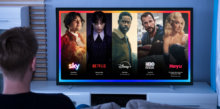The final frontier: telcos race to launch next-gen Super Bundling hubs
by Giles Tongue | 12 Jul 2023

New report reveals 88% of telco leaders in the US and UK want to offer Super Bundling content hubs
Almost nine in ten (88%) telco leaders in the US and UK are planning to offer Super Bundling content hubs.
As defined by Juniper Research, Super Bundling services consist of a single payment to a service aggregator — such as a telco — for multiple subscriptions such as streaming services, which are delivered through a single online subscriptions hub.
Super Bundling has emerged as a key strategy for telcos as they seek to protect, diversify and grow their businesses. Indeed, the need to create new revenue streams has been revealed as the number one priority for telco leaders, with over two-thirds (68%) citing it as ‘high priority’. That’s according to a survey of 115 US and UK telco leaders — senior strategic decision makers and budget holders within telecommunications brands.
The survey, commissioned by Bango, also found that increasing customer loyalty (65%) and accelerating customer acquisition (64%) are ranked as second and third ‘highest priorities’ for telco leaders.
Small steps become giant leaps
Simpler types of ‘bundling’ — such as free texts and minutes deals, or a single service included with your package such as sports streaming — have been a favored tactic of telcos for over 10 years.
However, these limited forms of bundling are no longer having the desired effect. The research has revealed that 68% of telco leaders admit they are now “struggling” to maintain engagement with their customers. It’s against this backdrop that 82% of telco leaders believe Super Bundling will now be “vital” for their customer acquisition and retention strategy.
Commenting on the data, Anil Malhotra, Bango co-founder, said: “The telco industry has entered a race to the top. The small steps of “one-off” third-party content deals are no longer enough to drive customer engagement — it’s time for a giant leap into Super Bundling. There’s a huge opportunity for telcos willing to respond to consumer demands for greater choice and control in how they use and manage the ever-growing number of subscriptions and streaming services in their lives.”
The next generation
Amidst fierce competition for customers, many telco leaders are quietly worried about falling behind. Well over half (63%) believe their organizations will lose revenue and market share if they fail to launch Super Bundling hubs.
Elaborating on the motivations behind this race, the research finds that almost 9 in 10 (87%) telco leaders believe Super Bundling offers a “competitive advantage”, with 88% agreeing that it will be a vital source of revenue in the future.
Malhotra added, “While the Super Bundling race has just got started, some of the biggest players in the market are already surging ahead.
“In the USA, Verizon has been making waves with its +play platform which brings together Netflix, Disney+, HBO Max, Paramount+ and dozens more services. Similarly, in Australia, Optus has launched SubHub, providing flexible access to a range of streaming services and subscriptions.
“These platforms go way beyond just video, offering a huge variety of apps spanning music, healthcare, fitness, productivity and more. As ever more telcos launch their own Super Bundling hubs, this variety and the ability to curate the services on offer will form a key point of competitive advantage. Whatever form it ultimately takes with each telco, this research makes clear that Super Bundling is here to stay.
“Given the critical importance of Super Bundling, it’s vital that telcos make the right technology choices. However, without the right partners in place, Super Bundling can become costly and time-consuming. By working with experts in the field, telcos free themselves up to focus on what matters most: delivering the right services and the best possible experience for customers.”
For more data on the state of the telco industry, view the full research report ‘From loyalty to acquisition, how Super Bundling became the new frontier for telco brands’ here.



